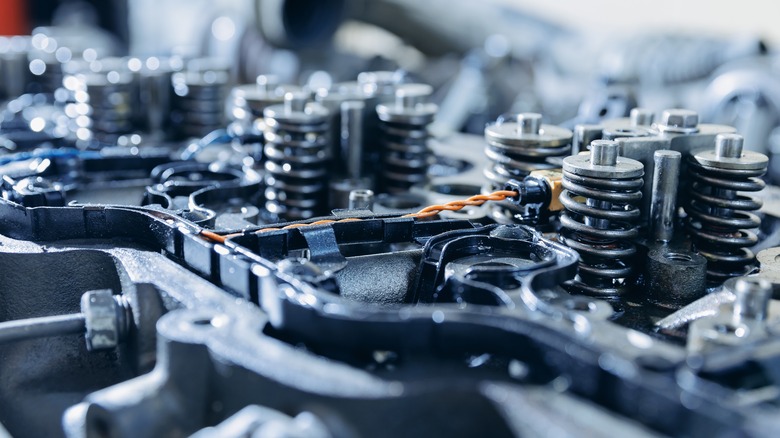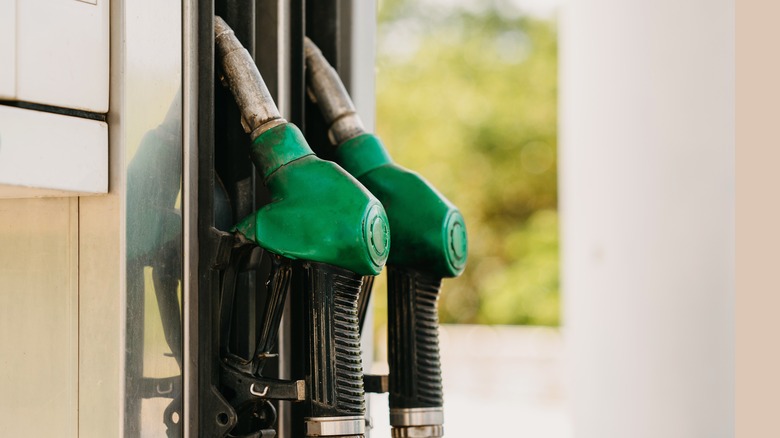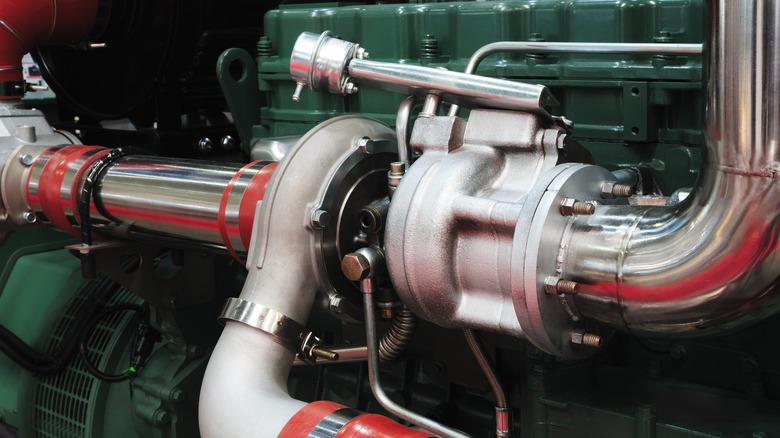This Is Why Diesel Engines Put Out So Much More Torque
In the current market, it is common to see new diesel trucks putting out over 1,000 lb-ft of torque from the factory. That's just in the consumer space. When it comes to heavy-duty industrial applications, some diesels — including the world's largest piston engine — are capable of producing torque figures in excess of seven-digits. The massive torque levels of modern diesel engines make them a fantastic option for military equipment, large-scale transportation, or any other application where the engine has to do more than just propel a vehicle. That is in addition to the other benefits that diesel engines have over gasoline engines, including increased thermal efficiency, better fuel efficiency, and better durability.
So, what is torque anyway? In technical terms, torque is force multiplied by distance, which is a measure of rotational force. Think of it as the same kind of force that it takes to open a jar — the more stubborn the jar, the more torque it takes to open it. In practical terms, the more torque an engine produces, the more work it is able to perform, whether that be towing, hauling, pushing, or pulling. Horsepower is relevant to the conversation too, as horsepower measures how fast an engine can perform that work. To tie it all together, a lot of torque is required to get a heavy load moving from a standstill, but a lot of horsepower is needed to get a heavy load moving quickly.
While gasoline and diesel engines work in a very similar way, using internal combustion to produce rotational motion, the design of each and the fuel that they use are different. As a result of those design differences and the characteristics of diesel fuel, diesel engines often produce a lot more torque.
Most diesels are long-stroke engines with high compression ratios
One of the most significant reasons that diesels produce a lot of torque is because they are designed to do so. While that might seem like a "duh" statement, it's not as intuitive as it sounds. Diesel engines are most often built as long-stroke engines, meaning that the stroke, or the distance that the piston travels in the cylinder, is longer than the diameter of the cylinder bore, or the width of the cylinder itself. There are a few important reasons for that, and all lend themselves to increased torque production. Having a longer stroke increases the overall volume of the cylinder, increases the leverage that the connecting rods can exert on the crankshaft (torque), and increases the ratio between the maximum cylinder volume and the minimum cylinder volume once the piston reaches its highest point (compression ratio).
Unlike gasoline engines, diesel engines don't use spark plugs to ignite an air and fuel mixture. Instead, they use a process called compression ignition to ignite the diesel fuel entering the compression chamber. During a diesel engine's intake stroke, air enters the cylinder without any fuel mixed in. The piston then travels back up the cylinder, compressing the air into a tiny space, superheating it to around 1,400 degrees Fahrenheit. The heat of the compressed air is enough to ignite diesel fuel which is injected directly into the combustion chamber as the piston reaches the top of the cylinder. The earlier and longer the fuel injectors spray fuel into the cylinder, the more pressure is created on top of the piston, creating even more torque.
Diesel fuel has a higher energy density
While gasoline and diesel are both made from crude oil, the process of refining them is very different. That refinement process makes a big difference in their combustion properties. The process of refining gasoline is much more intensive and transforms the raw mineral oil into a much thinner and more volatile substance with a caloric value of around 45.8 megajoules per kilogram. In contrast, diesel is a thicker substance with a lower caloric value of 45.5 megajoules per kilogram.
Despite containing less heat per kilogram than gasoline, diesel fuel's higher density means that it contains up to 15% more overall energy than an equivalent volume of gasoline. The high energy density of diesel plays well into the compression-based ignition system used by diesel engines, as the high cylinder pressures increase efficiency, in turn creating more pressure on top of the pistons and therefore more power and torque.
Most diesel engines are turbocharged
Turbocharging isn't a new concept for either gasoline or diesel engines, and both gain tremendously from forced induction. While turbos make a huge difference in gasoline engines, diesel engines almost need turbos in order to account for some of their shortcomings. Due to their long-stroke design and the heavy materials used to build them, diesel engines operate at extremely low RPMs. Because of that, diesel engines tend to lack horsepower. Breaking that down scientifically, the equation for horsepower is torque times engine speed (RPM) divided by 5252. As a result, a lower engine speed inherently means less horsepower. To counteract that, most major diesel engine manufacturers focus on increasing the torque side of the equation, and turbochargers work wonders for that.
Turbocharging transforms the performance of diesel engines, as the denser the air entering the cylinders, the more fuel can be injected, resulting in more power and torque overall. Turbos in diesel applications also reduce pumping losses associated with the combustion process. In essence, turbochargers make it easier for the engine to pump air in and pump air out. The reduction of pumping losses during the intake and power strokes increases torque overall.
Diesel engines are more durable than gas engines and can get away with running more boost as a result. A typical turbocharged gasoline engine used in passenger cars is typically limited to somewhere around 10-12 psi from the factory. In contrast, turbodiesel engines typically peak at between 25 and 30 psi. That is a massive pressure difference and plays a large part in why diesel engines are capable of producing far more torque than gasoline engines.



